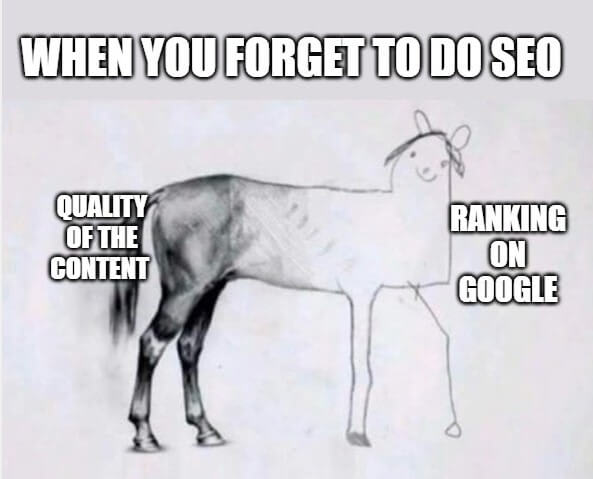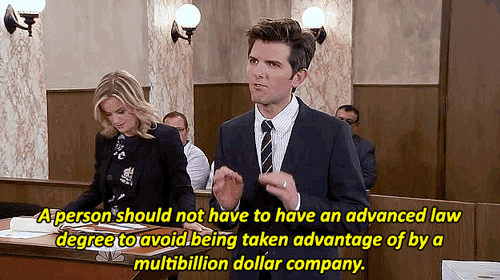I’m Tawny, author of Dry Humping and co-author of The Sobriety Deck, co-host of the Recovery Rocks podcast, and co-founder of the vinegar-based botanical beverage, (parentheses)
What’s in this Issue:
My fraught relationship with algorithms, the internet, and social media
How SEO controls journalism
How to confuse your algorithms
Why algorithms are low-key (high key?) cult leaders
Parks & Rec memes
Upcoming Book Proposal class info
Author Note: This is my first time writing about algorithms and SEO so I asked queen , author of Raising Hell, Living Well: Freedom from Influence in a World Where Everyone Wants Something from You (Including Me), to read it first. She gave incredible feedback, which helped me make some changes and then hit publish. Thanks, Jess!
This piece is far from perfect, but it felt great to write about a topic that deeply interests (and concerns!) me. I’m eager to learn more about these subjects, so please feel free to comment with info or links that can help me learn more.
Algorithms, SEO, and Other BS
I heard someone else’s algorithm recently. Let’s call him Dog Park Dude. DPD and I were both sitting in the dog park, a neighborhood spot I frequent at least once a day with my perfect angel noodle bean pickle butt pit bull, Stevie. Dog Park Dude sat next to me, scrolling through TikTok with no headphones, which means I heard all of the content that he either follows or was algorithmically targeted to him: Tucker Carlson and Alex Jones sound bytes, hunting tips, and anti-trans legislation/anti-abortion propaganda filled with misinformation and hyperbole.
It felt jarring to learn that this person I shoot the shit with daily holds views that advocate for pure hatred, lacking empathy and empirical data. How can someone so nice, so friendly believe such crap?!?!, I wondered. I realized that while he and I may live in New York City, in the same neighborhood, and attend the same dog park regularly, we live in entirely different worlds.
I use my social media pages to promote my work as an author and entrepreneur, so my algorithm reflects similar content back to me: social justice, sobriety, sex education, non-alcoholic drinks, mental health, and therapy memes. I don’t know what Dog Park Dude does for a living, but regardless, his algorithm speaks volumes about his interests and political leanings.
As
posits in this piece, “When you’re being faced with an algorithm, day in, day out, can you truly say your opinions, thoughts, style, likes, dislikes, and spending habits are 100 percent your own?”I realized that while he and I may live in New York City, in the same neighborhood, and attend the same dog park regularly, we live in entirely different worlds.
SEO Sucks, Too
Even those who don’t engage with social media are still guided by algorithms (I’m looking at you, NYT’s For You page!) or its not-so-distant cousin, SEO. You have to go to the second or third page of Google search results to find organic, non-sponsored, non-optimized answers to your questions. Check out this great piece by fellow journalist
about Google’s latest SEO changes.Editors assign journalists topics (and suggested words!) based on how they perform on SEO. SEO’s pay-to-play approach to news and “content” means that your search results only show you the stuff that people paid big bucks for you to know about. Think of all the incredible art and unbiased journalism that is rarely seen because of… budgetary restrictions.
SEO, paid sponsorships, and algorithms taint the information we have access to, ultimately influencing what we buy, eat, wear, and more. Yes, the internet has leveled the playing field, creating space for diverse discourse and equitable exchange, but it’s still just another place for businesses and people with the most capital to stay on top.
Algorithms: The Ultimate Cult Leader
As linguist and author
said in this interview on the Conspirituality podcast, “The algorithm is the ultimate cult leader.” Meaning that we’re all low-key (high-key??) being guided by the invisible hand of the almighty algorithm.The term algorithmic radicalization means that people are being radicalized by their algorithm’s extremism. Brainwashing has truly never been easier. Movements like QAnon, anti-vax, and the January 6th insurrection wouldn’t have nearly this much traction without the algorithm keeping people in a dangerous, conspiratorial loop of misinformation.
Confuse Your Algorithm
So what do we do now that we’re all indoctrinated in The Cult of Algorithms? Well, I guess you could go full Luddite. Or you can pull a Ron Swanson and toss your computer into the dumpster.
But realistically, my advice is to confuse your algorithm.
Listen to random songs - Stop letting music streaming services choose your playlist or your next song by throwing off your music algorithm. I go out of my way to listen to random songs that I haven’t heard in a while or songs I’ve never heard before. I also ask friends for music recommendations and listen to my record player as much as possible.
Watch random films - In a similar vein to throwing off my Spotify algorithm, I watch random TV shows and movies, so my Netflix and Hulu accounts can’t quite figure me out.
Click random YouTube videos - I watch videos and read tweets from conservative pundits because I want to know how the other side thinks. Perhaps it’s because I’m a journalist who’s always seeking the objective truth, but I want to know the GOP’s talking points to understand where they’re coming from so I can communicate effectively with conservative folks I know. I may see their side, double down on my own side, or find a neutral middle ground. Either way, hearing opposing views often helps me learn more about my own views through critical thinking.
Create a private social media account - I created a private Instagram page to stay in touch with close friends and family. I love this little safe haven free from productivity, politics, and polarization. I didn’t realize that the byproduct of creating a private IG account meant I’d get a whole new algorithm filled with my other interests: animal videos, fashion, music, cannabis/psychedelics, and art. Logging into this private account feels so safe, so freeing. Yes, it keeps me connected to my close friends and family, but it also keeps me connected to my playful, laid-back side. My physical demeanor literally changes when I toggle back and forth from both accounts. If logging into @tawnymlara feels like “clocking in,” logging into my private account feels like “clocking out” or even a full weekend away from work.
Get offline for a bit - Read a magazine or a newspaper. Go to a concert. Attend a protest. Listen to the radio. Visit your local library. Plan a picnic. Attend a cultural festival. The internet will still be there when you get back—I promise.
Ditch the Echo Chamber
Algorithms keep us locked in our own echo chambers while also selling our data to keep us further in the trenches. And yes, all of my suggestions for diversifying your algorithm are to “consume random or weird content.” Perhaps because I live my life by Jim Morrison’s quote, “Where’s your will to be weird?” If we stay inside of our own self-imposed boxes, our own echo chambers, our own For Your Page, we miss a lot of what’s going on in the real world. We’re probably not going to read the legalese-dense terms of service, so it’s time to confuse your algorithm.
I got sober so I could take control of my own life, not follow the suggestions of an algorithmic robot. Letting an algorithm dictate what I watch, read, listen to, and purchase feels similar to living my life in a booze-induced blackout because someone else is driving the bus—my bus—while I’m just along for the ride.
I love the internet; I just want to have a more mindful relationship with it.
How do you confuse your algorithm?
Additional Resources:
If the topic of algorithms interests you, check these out
This NYT rabbit hole about what the internet is doing to us.
This Katie Perry song about being chained to the (algo)rithm
This study about YouTube and social media radicalization
This book by
about the role of modern influence, social media, and algorithmsThis article about the dangers of confirmation and cognitive bias
This essay by
and about algorithms and Instagram face and body dysmorphia and plastic surgeryThis book by Kyle Chayka
Upcoming Classes:
I have two book proposal classes coming up! Book Proposal 101 is a one-night event that covers the basic elements of a book proposal, while my Book Proposal Boot Camp is a six-week intensive for folks who are ready to actually write their proposal this summer.
Here are the deets:
Book Proposal 101 VIRTUAL May 22nd, 7-9EST
Want to write a nonfiction book but have no idea where to start? Take my new virtual class! This course will help you understand what a book proposal is and how to actually enjoy writing one.
Whether you're pitching a nonfiction book or a nonfiction card deck, Book Proposal 101: Stop Dreading It and Start Writing It will help you feel empowered by the proposal process rather than overwhelmed.
OK, you might still feel overwhelmed, but you can totally do this!
Book Proposal Boot Camp VIRTUAL June 5th - July 10th, 7-9 EST
This 6-week intensive course picks up where the first one left off. In a virtual group setting, students meet with me for two hours a week to finally dust off that old Google Doc and get to work. Each week is structured so students can focus on one aspect of a book proposal at a time rather than feeling overwhelmed by the whole thing at once.
Each session ends with a 20-minute Q&A where students can ask about publishing, proposals, finding an agent, preorder campaigns, and book marketing.
Wish me luck at the dog park,
Tawny










Chock full of insight Tawny! Let's ditch the algorithm and get together in real life soon! XO!
Very interesting Tawny, thanks for this. I'm a software developer in recovery, and the big push right now is to use AI when possible, but with lots of caveats (review what is generated, don't take it at face value). I could see this relating in terms of echo chambers and building things that might unintentionally be even more targeted toward cis white males. Good to think critically and try to get out of our echo chambers when we can.